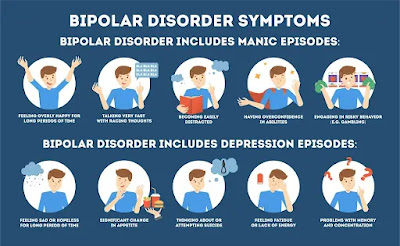Understanding and Managing Mood Disorders: A Comprehensive Guide
Introduction
In today's fast-paced world, it's not uncommon to experience fluctuations in mood. However, for some individuals, these mood swings can escalate into something more profound and persistent - mood disorders. In this comprehensive guide, we will delve into the world of mood disorders, exploring their various types, causes, symptoms, and effective management strategies.
Table of Contents
What Are Mood Disorders?
- Defining Mood Disorders
- Prevalence and Impact
Types of Mood Disorders
- Major Depressive Disorder (MDD)
- Bipolar Disorder
- Persistent Depressive Disorder (Dysthymia)
- Cyclothymic Disorder
- Seasonal Affective Disorder (SAD)
Common Causes and Risk Factors
- Biological Factors
- Psychological Factors
- Environmental Factors
Recognizing the Signs and Symptoms
- Depressive Symptoms
- Manic or Hypomanic Symptoms
- Mixed Symptoms
Diagnosis and Evaluation
- The Role of Mental Health Professionals
- Diagnostic Criteria
Treatment Approaches
- Psychotherapy
- Medication
- Lifestyle Changes
- Support Systems
Coping Strategies
- Mindfulness and Meditation
- Exercise and Nutrition
- Sleep Hygiene
- Stress Management
The Importance of Seeking Help
- Overcoming Stigma
- The Role of Supportive Friends and Family
Mood Disorders and Relationships
- Navigating Relationships with Mood Disorders
- Communication and Understanding
Living with a Mood Disorder
- Setting Realistic Expectations
- Embracing Self-Care
- Building Resilience
Prevention and Early Intervention
- Identifying Risk Factors
- Promoting Mental Health Awareness
What Are Mood Disorders?
Mood disorders, often referred to as affective disorders, encompass a group of mental health conditions characterized by significant disturbances in a person's mood. These disturbances can manifest as extreme sadness, elation, or fluctuations between the two. While mood swings are a part of everyday life, mood disorders represent a more persistent and severe disruption in one's emotional well-being.
Types of Mood Disorders
Major Depressive Disorder (MDD)
Major Depressive Disorder, commonly known as depression, is characterized by persistent sadness, hopelessness, and a loss of interest in activities. It can significantly impact daily functioning and quality of life.
Bipolar Disorder
Bipolar Disorder involves cycles of extreme mood swings, including depressive episodes and manic or hypomanic episodes. These fluctuations in mood can be highly disruptive and unpredictable.
Persistent Depressive Disorder (Dysthymia)
Dysthymia is a milder, yet long-lasting form of depression. Individuals with dysthymia often experience a low mood for years, with periods of more severe depression.
Cyclothymic Disorder
Cyclothymic Disorder is characterized by chronic mood instability, with less severe mood swings than bipolar disorder. It can still have a significant impact on daily life.
Seasonal Affective Disorder (SAD)
Seasonal Affective Disorder is a type of depression that occurs seasonally, typically in the fall and winter months. It is thought to be related to reduced sunlight exposure.
Common Causes and Risk Factors
Understanding the factors contributing to mood disorders is essential for effective management and prevention. These disorders result from a complex interplay of biological, psychological, and environmental factors.
Recognizing the Signs and Symptoms
Depressive Symptoms
Depressive symptoms may include persistent sadness, loss of interest or pleasure, changes in appetite or weight, sleep disturbances, and feelings of worthlessness.
Manic or Hypomanic Symptoms
Manic symptoms can involve elevated mood, increased energy, impulsivity, and a decreased need for sleep. Hypomania is a milder form of mania.
Mixed Symptoms
Some individuals experience mixed symptoms, with characteristics of both depression and mania simultaneously.
Diagnosis and Evaluation
The diagnosis of mood disorders is typically made by mental health professionals, including psychiatrists and psychologists. They use specific criteria outlined in the Diagnostic and Statistical Manual of Mental Disorders (DSM-5) to assess the condition.
Treatment Approaches
Effective treatment for mood disorders often involves a combination of psychotherapy, medication, lifestyle changes, and a robust support system.
Coping Strategies
Living with a mood disorder requires proactive self-care and coping strategies, including mindfulness practices, regular exercise, healthy nutrition, and stress management.
The Importance of Seeking Help
Breaking the stigma surrounding mood disorders is crucial to encouraging individuals to seek help. Support from friends and family plays a vital role in recovery.
Mood Disorders and Relationships
Navigating relationships with someone who has a mood disorder can be challenging. Effective communication and understanding are key to maintaining healthy relationships.
Living with a Mood Disorder
Managing a mood disorder involves setting realistic expectations, practicing self-compassion, and building resilience.
Prevention and Early Intervention
Identifying risk factors and promoting mental health awareness can help prevent mood disorders and facilitate early intervention when needed.
FAQs
1. Are mood disorders hereditary?
While genetics can play a role, mood disorders are influenced by a combination of genetic, environmental, and psychological factors.
2. Can lifestyle changes alone treat mood disorders?
Lifestyle changes are beneficial but are often most effective when combined with therapy and medication.
3. Is it possible to lead a normal life with a mood disorder?
Yes, many individuals with mood disorders lead fulfilling lives with the right treatment and support.
4. How can I support a loved one with a mood disorder?
Show empathy, encourage treatment, and educate yourself about their condition.
5. Are there alternative therapies for mood disorders?
Some individuals find complementary therapies like acupuncture or yoga helpful, but they should be used alongside conventional treatments.
Conclusion
Mood disorders can be challenging but manageable with the right resources and support. Seeking professional help, practicing self-care, and understanding the condition are crucial steps toward a brighter and more stable emotional future.





Comments
Post a Comment